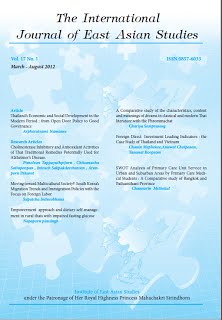SWOT Analysis of Primary Care Unit Service in Urban and Suburban Areas by Primary Care Medical Students: A Comparative Study of Bangkok and Pathumthani Province
คำสำคัญ:
Primary health care, primary care unit, SWOT analysis, urbanizationบทคัดย่อ
Background: Primary care, the “port-of-entry” into the health care system must consequently
adapt to higher demands and expectations from healthcare consumers. Urbanization has signif icant impact on health and quality of life, in which primary care units (PCUs) must rethink their service.
Objectives: The study aimed to compare the SWOT analysis of PCUs in urban and suburban
areas through an observational study of medical student experience with PCU health care delivery.
Methods: Students are divided into groups and sub-groups and experience the health service distributed by PCUs in urban and suburban areas in the context of Kolb’s experiential learning method. SWOT analysis is performed in comparison between these PCUs. After action review and presentation of SWOT results with PCUs is f inally carried out.
Results: It appears that health care which is provided by each PCU correlates with the nature of each population and the availability of skills in health care providers. This demands a different strategic plan for PCUs in urban and suburban areas. During the after action review, PCU personnel agreed with the SWOT analysis, even though students mentioned points that PCUs had overlooked.
Conclusion: A collaborative model between academic sector, service sector and social sector taking part in primary health care system is promising. SWOT analysis by medical students showed that PCU strategies should be tailor-made, depending on the character of the population and the PCU itself.



